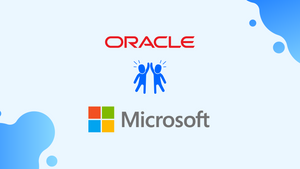On Wednesday, Oracle and Microsoft said that they were collaborating to introduce Oracle Database Service for Azure, a new service that will give Azure users direct access to Oracle databases operating on Oracle Cloud Infrastructure (OCI).
According to Kris Rice, vice president of software development for Oracle Database, the new offering is a managed service that enables businesses to provision and manage Oracle databases running on OCI using an Azure-native API and console. It is based on a three-year-old partnership between the two companies that allowed their common customers' enterprises to run workloads across Microsoft Azure and Oracle Cloud to reduce latency.
As a result, businesses may directly monitor Oracle databases from within the Azure environment.
In order to attempt and provide customers with a single pane view over their entire stack, Rice explained, "what we did was we grabbed all the metrics and logs that are naturally produced by the servers on the Oracle OCI cloud, and we're cloning them automatically over to the user side".
According to the companies, there are no fees associated with using Oracle Database Service for Microsoft Azure, Oracle Interconnect for Microsoft Azure, or data transfer when moving data between OCI and Azure. However, businesses are still required to pay for other Azure or Oracle services they use, such as Oracle Autonomous Database or Azure Synapse.
Lowering complexity for Developers and CIOs
According to analysts, the jointly built service, which is currently generally available, will simplify things for CIOs, data scientists, engineers, and developers.
According to Dave McCarthy, research vice president at IDC, "the new service allows organizations to transfer applications that are developed on Microsoft and Oracle technologies to the cloud with little to no changes by replicating the same technologies they are using on-premises".
According to Holger Mueller, principal analyst at Constellation Research, the service also aids developers in expediting app development and reduces the burden of maintaining many goods from various vendors.
The Era of Hyperscaler Cooperation
Although Microsoft and Oracle are mainly rivals, analysts noted that the burgeoning alliance between the two software behemoths is indicative of the direction that cloud clients are taking.
64% of respondents presently use a multicloud setup, according to IDC's 2021 IaaS View poll of 1,500 cloud customers. Of those, 75% have a cloud-based application that regularly communicates with databases in other clouds (either another cloud or on-premises).
According to Dave McCarthy, research vice president at IDC, this trend has become more prevalent as businesses have adopted a best-of-breed approach to computing infrastructure.
"Simply put, every cloud provider has an own set of strengths, and clients want to combine and contrast services to achieve the greatest results. Sadly, creating and maintaining a multicloud environment can be challenging and expensive", McCarthy continued by stating that these difficulties are prompting hyperscalers to work together.
If the best-of-breed strategy is maintained, similar agreements with other cloud service providers, such as Google Cloud and AWS, can be anticipated in the future.
OCI and Azure face relatively little direct competition, even though the cloud service providers normally do, according to Tony Baer, principal analyst at dbInsight, which is another factor in the Microsoft-Oracle alliance.
Although both companies provide business SaaS and DBaaS services, Baer continued, "the partnership seems like a natural fit given that the bulk of Oracle's customers with back-office Oracle databases and applications use Microsoft Office for the front office".
Oracle and Microsoft are hardly the only companies working together while competing, according to Baer.
Targeted ties between the biggest public cloud providers (AWS, Azure, Google Cloud Platform) and those with a smaller customer base are emerging as hyperscalers compete (OCI, IBM Cloud), said Baer.
The hyperscalers will collaborate to sell and support third-party offers that compete with some of their own internal DBaaS or SaaS services, according to Baer. Examples of this collaboration include AWS and MongoDB, Azure and Redis, and GCP with a number of open-source databases.
Another instance of competition is the relationship between IBM and AWS, through which Amazon provides a variety of IBM SaaS services, including capabilities for automation, data and AI, security, and sustainability.
Oracle's OCI Cloud Push
Oracle has recently reduced the cost of its dedicated region offering in an effort to attract more customers. They have been consistently investing in developing its cloud services, particularly OCI. OCI made a significant contribution to the company's fourth quarter sales growth for the fiscal year 2022.
Analysts predict that the new Oracle Database Service for Azure service will increase OCI's customer base.
"The new service aims to make it easier to migrate workloads that are still on-premises. This integrated solution can support Oracle environments that may not have been easily migrated into Azure" added McCarthy.
According to Baer of dbInsights, the service also gives Oracle an advantage over rival AWS.
As a result of OCI's intense competition with AWS in the DBaaS market, Baer continued, "Oracle offers price guarantees that its Autonomous Data Warehouse will be around half as expensive as Amazon Redshift".
According to Matt Aslett, research director at Ventana Research, Oracle Database Service for Azure is specifically targeted at businesses that prefer Microsoft Azure as their cloud provider but still want to use Oracle's distinctive database offerings, such as Oracle Autonomous Database and Exadata Database Service.


